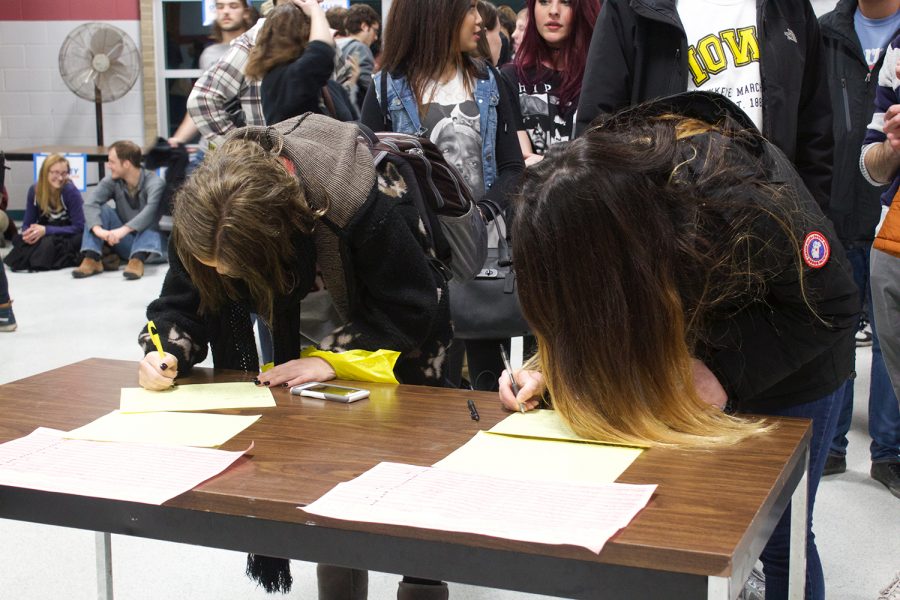What are the Iowa caucuses and how do I caucus?
Jan. 17 is the final day for a new early check-in process for the Iowa Democratic caucuses. Iowans can still register on caucus night for either parties’ quadrennial contest Feb. 3, and The Daily Iowan has everything you need to know to plan ahead.
Students and members of the community sign in to caucus for the Democrat Party in the Robert Lee Rec Center on February 1, 2016.
January 17, 2020
The famed first-in-the-nation Iowa caucuses are fast approaching, and today marks the last day to check in early to your caucus site for the Democratic caucuses. On Feb. 3, Iowans across the state will pledge their support for a candidate, the first state on the presidential nominating calendar, with the eyes of the nation trained on the Hawkeye State.
As Iowa’s bluest county, Johnson County Democrats have been madly preparing for the expected record turnout at their 57 Democratic caucus locations.
“It’s busy. It’s a lot of work,” John Deeth, a Johnson County Democratic caucus organizer, said. “…It’s a lot of emails and phone calls, I’m checking in with our 57 precinct chairs, I’m having chairs check in with locations, troubleshooting problems.”
The Republican Party will be holding caucuses as well, and with two primary challengers to President Trump, the party will be holding its traditional straw poll.
The Daily Iowan has everything you need to know before caucus night.
Where?
The Democratic caucuses will take place at 1,678 caucus sites around the state. You can find your caucus site here.
The Iowa Democratic Party has also designated 99 satellite caucuses beyond the regular caucus sites, including seven in Iowa City. Today is the last day to sign up for a satellite caucus before 6 p.m. Otherwise, you’re not required to sign up for open satellite caucuses that will be held after 6 p.m.
The Democrats are offering an early check-in option for the first time this time around, and the party is encouraging interested caucusgoers to check in online before caucus night. The deadline to check in early ends today, Jan. 17.
The Republicans will have 1,683 caucus locations around the state on caucus night, which can be found here.
When?
The caucuses, for both Democrats and Republicans, will be held on Feb. 3. Unlike primary elections, which generally have polls open for voting all day, the caucuses begin at 7 p.m., and prospective caucusgoers will need to show up then in order to participate. Depending on the number of attendees, a caucus can last anywhere from a few minutes to a few hours.
What happens?
At the Democratic caucuses, participants will break up into groups based on their presidential preference. If a candidate fails to garner 15 percent of attendees at the caucus site — this is called gaining “viability”— that candidate’s supporters will be given the chance to join another group or gain enough supporters to reach viability. Delegates are awarded based on a final count of these groups.
One important note — if a candidate reaches viability in the first alignment, that candidate’s supporters are locked in and unable to change later on.
A Republican caucus is conducted through what is called a “straw poll.” Caucusgoers write the name of their preferred candidate on a piece of paper and hand it to a designated official. The final tallies are counted up and delegates are awarded based on the final numbers.
How?
You need to be registered with a party in order to participate in that party’s caucus. You can register online — or change your voter registration in order to participate — at the Iowa Secretary of State’s website.
You can also register or change parties on the night of the caucuses. The Iowa Democratic Party is not requiring any materials be brought for registration or participation, but you need to know the last four digits of your social security number or Iowa driver’s license number to fill out the registration form. You will need to bring an ID to register at the Republican caucuses, according to the website.
For more information visit the Iowa Democratic Party site and the Iowa Republican Party site.
Who’s running?
There are 12 Democrats up for consideration in the Democratic caucuses:
- U.S. Senator from Colorado Michael Bennet
- Former Vice President Joe Biden
- Former New York Mayor Michael Bloomberg
- Former South Bend, Indiana Mayor Pete Buttigieg
- Former U.S. Representative from Maryland John Delaney
- U.S. Representative from Hawaii Tulsi Gabbard
- U.S. Senator from Minnesota Amy Klobuchar
- Former Massachusetts Governor Deval Patrick
- U.S. Senator from Vermont Bernie Sanders
- Billionaire businessman and political donor Tom Steyer
- U.S. Senator from Massachusetts Elizabeth Warren
- Businessman Andrew Yang
Despite a Republican incumbent occupying the White House, there are still challengers in the primary. Three Republicans are seeking the nomination:
- Incumbent President Donald Trump
- Former U.S. Representative from Illinois Joe Walsh
- Former Massachusetts Governor Bill Weld



